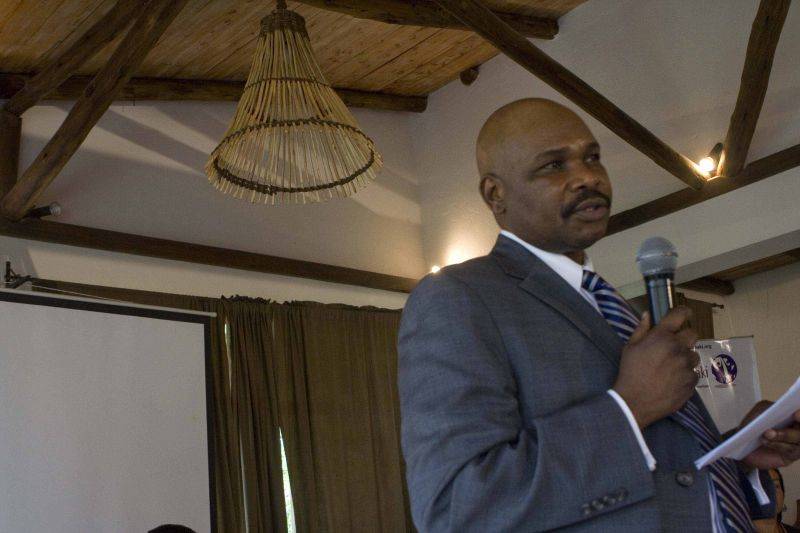Human Rights Scholar Makau Mutua delivers ‘Straight’ Talk on Homosexuality in Kenya
Nairobi, KENYA (16 February, 2010) – Never once did Distinguished Professor Makau Mutua, renowned human rights scholar and activist, mince his words during the two presentations he made in Nairobi earlier this week on the sensitive but timely topic of Sexual Orientation and Human Rights. On the contrary, ever so gracefully, he managed to be firm, direct and equally provoking with two diametrically opposed audiences: human rights activists in the morning and a cross section of the general public in the evening.
“It is useless and hypocritical to fight one form of oppression and discrimination while supporting another,” he said as he explained the concept of anti-subordination, one of three key ideas he introduced for developing a strategy to fight abuse and reduce powerlessness. “You can be sure that someone who is a racist, is also homophobic, sexist, misogynist and hates poor people,” he added as some members of the audience were starting to feel visibly uncomfortable in their chairs.
To the human rights crowd that attended the morning session, Professor Mutua also the dean of the University of Buffalo Law School, underscored the need think about how a claim becomes a right in order to map out an effective strategy for successfully addressing systematic discrimination and life threatening behavior towards people with different sexual orientation in Kenya, Mutua’s native country, which he referred to as a “deeply conservative, a reality that breaks my heart.”
Mutua reminded human rights activists in Kenya that they have normative obligations to fulfill as rights-based agencies. “You can’t pick and choose what rights to focus on. When you fight for liberation, you fight for total liberation of the human condition; you fight against all forms of discrimination,” he said while urging activists to address homophobia in their midst first and foremost as they embark on yet another struggle for promoting human rights in Kenya.
His lecture came just a few days after a raid on planned gay wedding in the coastal town of Mtwapa that resulted in the arrest of five suspected homosexuals. This event, widely reported on Kenyan media, unearthed public venom towards the gay and lesbian community spearheaded by leaders of the Christian and Muslim communities who, among other things, have called on the government of Kenya to investigate government institutions that provide medical services to homosexuals and close down facilities that cater to them, including hotels and bars.
“I don’t trace homophobia to the African culture,” said an impassionate Mutua. “I trace it to Christian and Islamic cultures.” Furthermore, he said, “We are all imprisoned by our fears and stereotypes.” Most people who are anti-gay, he ventured to say, never really think about their own sexuality because, “Maybe they are afraid of what they would find out. What happens if you embrace or kiss someone from the same gender?”
While the discussion with human rights activists in the morning focused on strategy, the evening session inevitably led to remarks often heard in the mainstream discourse on why Kenya should not uphold gay rights. “In Africa homosexuality is not accepted because this is how we have been brought up,” said a young woman in the Q&A evening session.
“If you say that sexual orientation is an expression of desire, what do you say about pedophiles or murderers? Are they not also following their desire to sleep with children or to kill people?” asked a slick-talking lawyer who, “begged to differ with the notions put forth by the distinguished law professor.” Someone else was keen to quote scriptures from the Bible that ban homosexuality to make the point that religion does indeed condemn such, “immoral acts.”
Other panelists came to the rescue of dean Mutua’s arguments in the evening session, most notably Revered Michael Keminchi who has been an Anglican minister in Kenya for the past 30 years and who heads a ministry that advocates for the full acceptance and inclusion of gay, lesbian, transgender individuals and their parents. “To deny acceptance and inclusion of our brothers and sisters on the basis of scriptures, is to refuse contextual, historical and critical interpretation of scriptures,” he said. “It is to practice religious bigotry and intolerance, which add up to homophobia and it is also to forget the purpose for which God, in whatever religion it interacts with us, is to meet the needs of the most vulnerable.”
Finally, anthropologist Jasper Imungi of the University of Nairobi, reminded an increasingly restless audience in the evening session that, “nobody has a monopoly of knowledge, ideas and speech.” Adding that in Kenya, “some people abrogate themselves to be the mouthpieces of others and constantly use words like Kenyans have, Kenyans don’t, Kenyans do. As an anthropologist,” he said, “who gives you the moral authority to set the moral prefix?”
In a poignant conclusive remark, Professor Mutua said that, “Culture is the last refuge of the scoundrel. People who are burned out of arguments always run to culture. But let me remind you that there is not one single culture. There are many and cultures are dynamic and always changing.”


































i-Italy
Facebook
Google+
This work may not be reproduced, in whole or in part, without prior written permission.
Questo lavoro non può essere riprodotto, in tutto o in parte, senza permesso scritto.